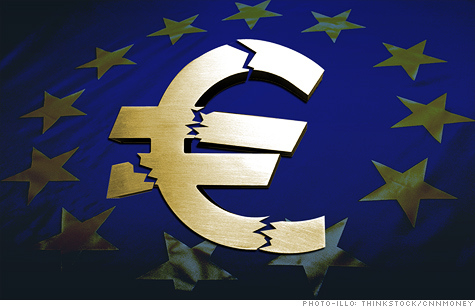By Leonid Bershidsky, Bloomberg
Whatever you hear to the contrary, it isn't fine with Germany if Greece leaves the euro. The government in Berlin is probably just trying to influence the outcome of the Greek election on January 25, which the far-left Syriza party may win. A so-called Grexit is contrary to Germany's long-term economic interests and Chancellor Angela Merkel will do her best to keep Greece in the fold.
Last week, the Rheinische Post quoted Michael Fuchs, deputy head of Merkel's CDU faction in the German parliament, as saying this:
The time when we had to rescue Greece is over. There is no more blackmail potential. Greece is not systemically relevant for the euro.
Then, on Saturday, came an unattributed report in Der Spiegel that Merkel and her finance minister Wolfgang Schaeuble are no longer prepared to fight to the last drop of blood to keep Greece in the euro zone. The magazine's sources cited the same reasons as Fuchs to explain why a Grexit would not be a nightmare: European financial rescue mechanisms have been set up since Greece first became a problem; Spain and Ireland have exited their bailouts; and banks have cleaned up their balance sheets, reducing exposure to toxic debt.
Since the Spiegel piece came out, Peter Tauber, CDU general secretary, issued a halfhearted denial. He told Deutschlandfunk radio that he "didn't see" a Grexit happening and, in any case, conditions have changed in the last couple of years to make such an extreme event less damaging to the euro.
Perhaps coincidentally — but probably not — Greece's outgoing Prime Minister Antonis Samaras started his election campaign by warning that a victory for current poll leader, Syriza, would mean default and an exit from the euro. Together, he and the Merkel allies in Berlin are sending a message to Greek voters: Keep a version of the old government in place, or when Syriza leader Alexis Tsipras ups the ante by demanding debt forgiveness and relief from the terms of Greece's bailout, Germany will let Greece drop out of the euro. This is a poker game in which both players are bluffing.
Tsipras' promise to roll back the austerity program that conditioned Greece's rescue by the so-called troika — the International Monetary Fund, the European Central Bank and the European Commission — is a threat to trigger a chain reaction in the euro area. If Greece abandons the euro and its massive debts, its example could be infectious in Spain, where Podemos, a grassroots movement similar to Syriza, is doing well in opinion polls. Italy, too, suffers from its inability to devalue its currency as it often did in the days of the lira.
Yet Tsipras must realize that a costly mess would ensue for Greece, and that the inevitable devaluation of a newly-reintroduced drachma might make him as unpopular as austerity has made his rivals. He cannot be sure that a maverick Greece, devoid of EU and IMF support, would be economically viable.
In Berlin, meanwhile, Merkel's allies are surely signaling more certainty than they feel when they say fallout from a Grexit could be contained. Merkel's economic adviser, Peter Bofinger, told Die Welt at the weekend that if Greece were to leave the euro this would "let the genie out of the bottle." Even if the economic impact could be contained, the political consequences would be unpredictable. The EU would become even more fragmented, making separate countries more vulnerable to outside influences. Russian President Vladimir Putin, for one, would welcome the increased instability in Europe. An anti-euro, anti-German backlash in Southern Europe would threaten Germany's leadership on the continent.
Besides, any damage to the euro zone could threaten Germany's growth prospects. According to a 2013 policy paper by the Bertelsmann Stiftung, euro membership increases Germany's annual economic growth by 0.5 percent of gross domestic product. Germany stands to gain 1.2 trillion euros ($1.4 trillion) from it between 2013 and 2025, much more than it would contribute to any Greek bailout. The amount Germany could lose if Greece reneged on troika debt — 70 billion euros in taxpayer funds — pales in comparison.
It all comes down to whose bluff is more convincing. Though Merkel is playing with a bigger pile of chips, my bet is on Tsipras. Greece's debt is not sustainable, while austerity policies are a huge political liability — and not just in Greece. The Princeton professor and ex-IMF economist Ashoka Mody argued recently that the troika should allow Greece to spread out its debt repayment over 100 years — effectively writing it off. This would allow Greece to make a fresh start with private creditors, who Mody thinks might do a better job of monitoring Greece's reform progress than the EU has done:
Greece—which has been a source of endless disruption—can, for once, be the edge that leads onwards to a more fundamental change in the eurozone’s architecture. Loosening European ties and allowing countries some real flexibility in managing their national affairs may, in fact, be the only way of stopping the march of the most egregious forms of European nationalism. It may be the only way to give Greece a real chance—and it may be the only way to save the euro.
Merkel's coalition partners from the Social Democratic party apparently aren't in on the bluff and their stated views reflect Germany's weak position. SPD leader, Economy Minister Sigmar Gabriel said at the weekend that "the goal of the entire federal government and the EU" was to keep Greece in the euro, and that there was no alternative plan. That message won't help Samaras much in his election campaign, but it's probably closer to the truth than the Merkel camp's semi-official warnings.









